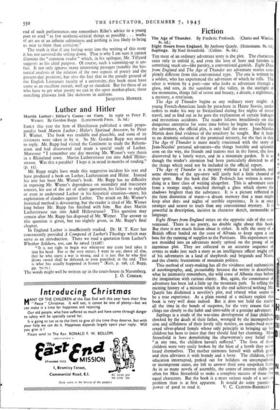Luther and Hitler
Martin Luther : Hitler's Cause—or Cure. In reply to Peter F. Wiener. By Gordon Rupp. (Lutterworth Press. 3s. 6d.) EARLY this year the firm of Hutchinson published a small propa- gandist book Martin Luther ; Hitler's Spiritual Ancestor, by Peter F. Wiener. The book was readable and plausible, and some of its reviewers were taken in by it. So Mr. Gordon Rupp was moved to reply. Mr. Rupp had visited the Continent to study the Reform- ation and had discovered and made a special study of Luther. Moreover "I remember one day 'meeting Mr. Wiener's very thesis in a Rhineland town. Martin Lutherstrasse ran into Adolf Hitler- strasse. Was this a parable? I kept it in mind in months of reading."
(P. 15). Mr. Rupp might have made this suggestive incident his text and have produced a book on Luther, Lutheranism and Hitler. Instead his text has been Mr. Wiener's book. Mr. Rupp has no difficulty in exposing Mr. Wiener's dependence on secondary and inaccurate sources, his use of the art of select quotation, his failure to explain or even to understand Luther in his historical situation—more, his exploitation of slanders against Luther. The attack on Mr. Wiener's historical method is devastating, but the reader is tired of Mr. Wiener long before Mr. Rupp has finished with him. But does Martin Lutherstrasse run into Adolf Hitlerstrasse? This question may remain after Mr. Rupp has disposed of Mr. Wiener. The answer to this question is given, but too slightly given, in Mr. Rupp's final chapter.
In England Luther is insufficiently studied. Dr. H. T. Kerr has conveniently provided A Compend of Luther's Theology which may serve as an introduction. There we read a quotation from Luther's Whether Soldiers, too, can be saved (i526Y: "'It is not right to begin war whenever any crazy lord takes it into his head. For at the very outset, I want to say, above all else, that he who starts a war is wrong, and it is just that he who first draws sword shall be defeated, or even punished, in the end. This is what has usually happened in history." (Kerr, p. 598, c.f. Rupp, pp. 70-71.)
The words might well be written up in the court-house in Nuremberg. J. 0. COBHAM.






























 Previous page
Previous page